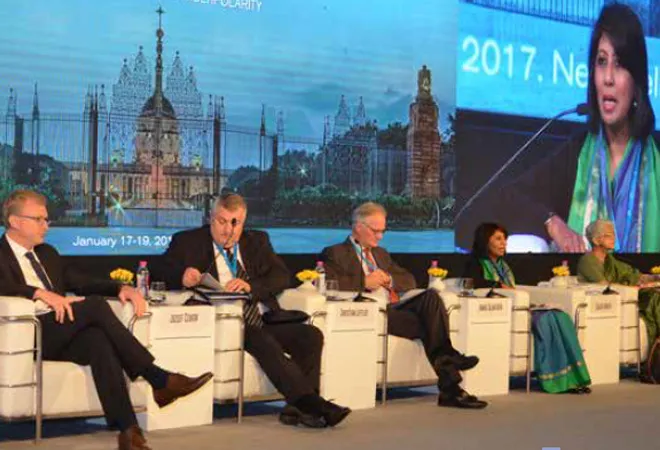
As the European Union faces existential pressures from both within and outside its boundaries, there is a strong need for the Union to reinvent itself once again. This was established at a panel discussion on “Future of Europe” during Raisina Dialogue 2017, the year that marks the completion of 60 years of the signing of the Treaty of Rome that laid the foundations of the European Economic Community (EEC).
The formation of EEC was an unprecedented move and came from the same continent that gave to the world the enduring template about the state in 1648. Thus, at a time when the rest of world was embracing sovereignty with open arms, Europe did something unprecedented by taking steps towards supranationalism. Over the next few decades, EEC evolved from a purely economic community into the European Union (EU), ning policy areas, ranging from climate, environment and health to external relations, security, justice and migration.
It cannot be denied that the EU is a great experiment towards political and economic integration. At the peak of its prosperity, it underwent the largest round of expansion in 2004 to include countries in central and eastern Europe. This, in itself, was an achievement since eight of the 10 countries that joined the EU came from the former Communist Bloc. By fulfilling the Copenhagen criteria that included a free-market economy, a stable democracy and the rule of law — along with acceptance of all EU legislation—their membership became symbolic in attracting other countries towards a prosperous Union. The European approach to international issues was also regarded as the ideal one. This prosperity was, however, short-lived as the 2008 financial crisis opened the Pandora box of EU’s problems.
By 2009, it was apparent that Greece would most likely default on its debt. Something that began as a debt crisis in Greece soon escalated into a broader economic Eurozone crisis, subsequently transforming itself into a political crisis for the EU. As the Union struggled to cope with Eurozone, other challenges in the form of neighbourhood instability, refugee influx and rise in populism, among others, began to crop up. While the Union is now nearing a decade of crisis, the most severe blow came in 2016 with the vote on the UK’s exit from the Union.
A series of crises since 2009 have raised questions about the sustainability of the project. Optimists argue that obituaries for the EU are premature as it is likely to survive, given its ability to reinvent itself. For them, the crisis is an opportunity for the Union to integrate even stronger while undergoing reforms. Pessimists, on the other hand, cite the example of the Soviet Union’s demise, which was perhaps unthinkable to policymakers in the 1970s. They argue that the break-up of the EU could be an “unintended consequence of the Union’s long-term dysfunctioning, meddling tendencies and misguided reforms compounded by the elite’s misreading of political dynamics.”
In the current phase of globalisation, where uncertainty and disruption have become the new norm, Europe is no exception. Irrespective of the ongoing crisis, the Union is considered as one of the most successful models of regional integration. Former diplomat Sujata Mehta stated that the layers or multiplicity of institutions, with which the integration of Europe has been pursued, has often intrigued other actors in the world, who tend to have similar agendas but find it difficult to pursue and maintain even a single regional integration process.
However, it is important for the European consensus to include a lot more voices to gain its footing back as an integration model for the rest of the world.
One of the prime causes of people in the United Kingdom voting for Brexit because they were very concerned, among other things, about the whole concept of free movement. — Geoffrey Van Ordenn, Member, European Parliament, UK
The Head of EU Foreign Policy at Belgium’s Centre for European Policy Studies, Steven Blockmans, used the forum of Raisina Dialogue to propose ways for the EU to redeem itself. He suggested that the EU should first maintain unity among big and small states to lead towards stability. Second, it should stop being an elite-driven European project that does not have many takers among the masses who are drawn to the populist narrative. Third, the Union needs to stress on its role as an actor capable of adding value, both in terms of bringing prosperity to its citizens as well as soft and hard security for the nations. As of now, the Brexit referendum has proven that the EU is drifting away from its citizens who are either ignorant of or unsatisfied with the direction in which EU policymaking is progressing.
The views expressed above belong to the author(s). ORF research and analyses now available on Telegram! Click here to access our curated content — blogs, longforms and interviews.




 PREV
PREV

